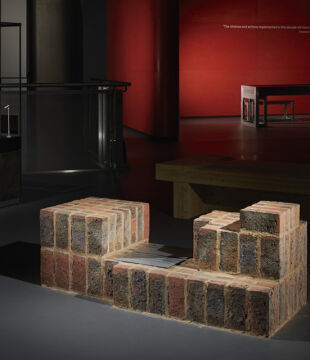
Details
Project Country: Limerick, Ireland
Architect: Níall McLaughlin Architects
Brick Manufacturer: Michelmersh Brick Holdings PLC, Ketley Brick
Contractor: Conneally Construction Limited
About the project
Judges Comment:
“The museum celebrates the game of rugby through Brick. The combination of three types of handmade clay bricks was used to achieve a façade that both compliments and reinvigorates the historical Limerick city centre”
The International Rugby Experience is a new cultural institution and visitor experience to honour the worldwide game of rugby. Located in the heart of Limerick, this ambitious project seeks to reinvigorate the city centre, complement the existing local arts and heritage attractions and forge links with Munster rugby.
Set amongst the terraces of Limerick’s Georgian Quarter, the design approach was to consider this as a new civic building. Architectural proposals were developed through research into historic public buildings in Georgian streetscapes, referencing churches and town halls. The 7-storey building provides an interactive visitor experience, ground floor retail area and first floor café adjacent to a double-height entrance hall, and flexible exhibition, education and event space in the basement. It is crowned with a public hall at the top that offers panoramic views and acts as a beacon, visible from afar. A grand entrance portico addresses the busy main street, providing shelter and creating a public space below where visitors gather and fans meet on match days.
The ambition was for a beautiful, contemporary tall brick building that complements and enhances the historic red brick terraces. Externally, this is achieved through a combination of brick-clad pre-cast façade panels and traditional handlaid brickwork. The façades are given a sculptural quality through the articulation of deep vertical brick piers, with horizontal pre-cast concrete elements spanning between these, creating a series of recessed bays. The proportions and rhythm chime with the Georgian streetscape while the balance of openings and solid wall is arranged to suit the building’s interior functions. The exposed pre-cast lintels and cills are pigmented to match the red brickwork and this combination of brick and precast reflects in a contemporary manner the brick and stone detailing on local churches.
Both inside and out, structural forces are expressed through brick and vault detailing to create a building that reflects some of the forces found in the game of rugby, this is reinforced through brick-format clay quarry tile floors from Ketley Brick throughout the interior of the building . Ketley Brick provided 45,000 of the quarry tiles for the interior of the building, 41,500 in light multi and 3,500 in Staffordshire Blue which create a sense that the interior spaces are carved out of a brick mass
The building is set out to brick dimensions, minimising wastage. The structural and brick expression provide a tangible link to the building’s function and will be key to the visitor experience.
To achieve a colour tone that fits with the local historic brickwork, a blend of three handmade clay red bricks by Charnwood were selected: 33% Multi Brindle, 33% Ashby Red and 33% Horsham Red Multi. These frogged bricks have 4 usable faces so that when cut in half for use as a brick slip on the façade panels, the remaining half could also be used rather than wasted and the exposed frog helps key the brick into the concrete. By using handmade bricks, we ensured that the colour and finish of the numerous specials would match the standard bricks. A pale mortar was specified to reference the colour of traditional lime mortar. This allows the brick texture and bond to be read from a distance, animating the façades.
Sponsored by Brick Awards

The Annual Brick Awards is an Architectural competition aimed at attracting and showcasing architects wishing to submit their brick projects for recognition and celebration. Attracting 300 entries in 17 hotly contested categories every year, it has become one of the most popular events in the construction calendar. If you wish to sponsor this award, please contact George Spreckley

















